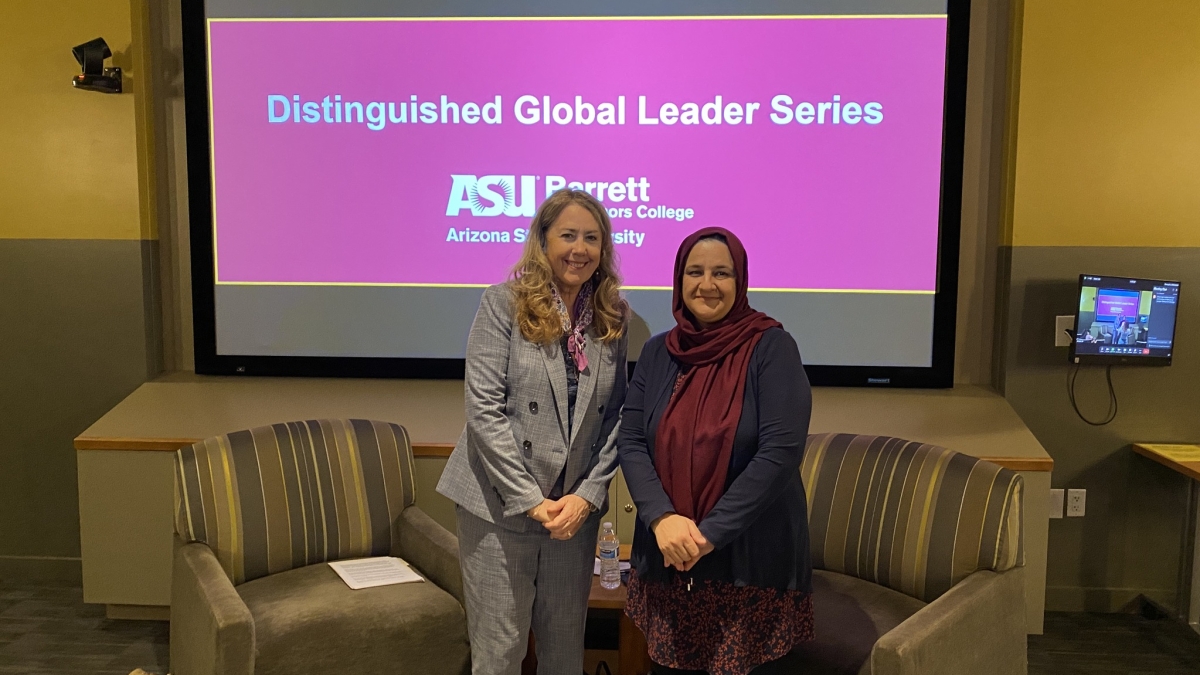Former Afghanistan minister of education encourages students to be proactive in their community

Rangina Hamidi (right), former Afghan minister of education, with Barrett Honors College Vice Dean Kristen Hermann at the Distinguished Global Leader Series on Jan. 29 in Tempe. Photo courtesy Barrett Honors College
In a recent wide-ranging conversation, Rangina Hamidi, Afghanistan’s former minister of education and a longtime advocate for women’s empowerment through social entrepreneurship, shared her views on foreign policy, education reform, conflict resolution and responsible leadership.
Her talk, on Jan. 29, was hosted by Barrett, The Honors College at Arizona State University as part of its Distinguished Global Leaders Series.
Hamidi was born in Kandahar, Afghanistan, in 1978, and as a young child emigrated to Pakistan along with her family. She then emigrated to the United States in 1988, became an American citizen, and earned a bachelor’s degree in religious and gender studies from the University of Virginia.
Hamidi returned to Afghanistan in 2003, where she worked to better the lives of Afghan citizens through development projects, advocacy and education.
Hamidi also led the Mezan International School, which offered an internationally accredited curriculum with a solid foundation of Islamic education, Afghan history, Afghan values and multilingual education.
She was minister of education of Afghanistan for 14 months, until Kabul fell to the Taliban in August 2021 and she returned to the U.S. with her husband and daughter.
Hamidi, a professor of practice in ASU’s Thunderbird School of Global Management, is well versed in child development, educational psychology, educational management, Islamic pedagogy, curriculum, business administration, development in conflict-affected countries, and gender issues from an Islamic perspective.
She has contributed to numerous publications and radio programs, including TIMES Asia Magazine, The Globe and Mail, Der Spiegel, Business Week, The Guardian, The Telegraph, NPR, BBC and Voice of America. She also co-authored the book “Embroidering within Boundaries: Afghan Women Creating a Future."
The complexity of conflict resolution
During the Distinguished Global Leaders Series talk, Hamidi explained how she became the minister of education after receiving a call from Afghanistan’s president and what she did to restructure the ministry's focus on serving schoolchildren.
“Imagine going to some place whose entire purpose is to serve children to make their futures better than what they have. That was not the focus, the focus was to please such and such a political party, and such and such a big jihadi warlord who himself had never been to school,” she said.
Her background as the principal of a flourishing STEM school helped her reform the ministry by hiring better staff and redesigning school curricula, as well as restructuring the political office to disincentivize corruption.
Hamidi said she is skeptical of leaders who use their “primal brain” to make decisions rather than relying on logic.
“I feel like most world leaders have reverted back to using their primal brain because it’s the only way to solve their problems, and their views are to go and fight rather than sit and talk and diplomatically come to an agreement,” Hamidi said. “How can I trust a leader that is so primal in his thinking, of solving conflicts and issues?”
Hamidi said leadership is about valuing communication over conflict and destruction, a trait she doesn’t see currently in world leaders.
However, Hamidi shared a pragmatic approach to dealing with diversity of opinion as a leader.
“Eight billion people are never going to think alike. It’s unnatural,” she said. “One of the promises of American democracy that I've studied is that we agree to disagree and respect each other for that. We don't have to kill each other just because we disagree, but we just disagree on that subject,” she said.
She emphasized the impact of grassroots activism in bringing about change. Hamidi told students to work directly with their chosen community, no matter how difficult it gets.
“It’s really the grassroot-level activism, particularly political activism, that brings about change. Don't be swayed by people saying it won't make a difference,” Hamidi said. “It will make a difference in your life of who you are, what you believe in and what you're building.”
Debunking stereotypes
Hamidi also talked about her traditionalist Pashtun father who passionately supported girls' education, despite stereotypes about Pashtun men holding girls and women back from school.
She said most people don’t know all of Afghanistan’s identity, choosing to just focus on wars and conflict, and don’t know about what else the country has to offer.
“We probably find some of the most beautiful Islamic architecture in the region, and you still see that element in the north of Afghanistan,” Hamidi said. “Afghans are in such a diverse country that if you go and study the embroidery techniques, they’re completely different from the north versus the east and west. It’s a tapestry of so much art and talent.”
Story by Barrett Honors College student Mia Osmonbekov, a member of the Current Foreign Affairs International Reporting at Cronkite (CFAIR), an organization for ASU students interested in international reporting and global affairs.
More Local, national and global affairs

How ASU research is helping first responders
Arizona State University’s faculty members are studying how to improve the jobs, health and well-being of first responders, and also applying their research through direct training to help these…
ASU honors Sun Devils, local organizations with Social Work Month Awards
Arizona State University’s School of Social Work recently honored a total of 29 students, faculty, staff, alumni and local community organizations with its annual Social Work Month Awards.The…

ASU's USAID projects provided economic benefits to US
For more than a decade, Arizona State University has helped people around the world — and advanced interests in the United States at the same time — through its collaborative projects with the U.S.…

